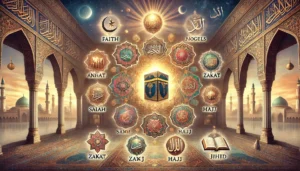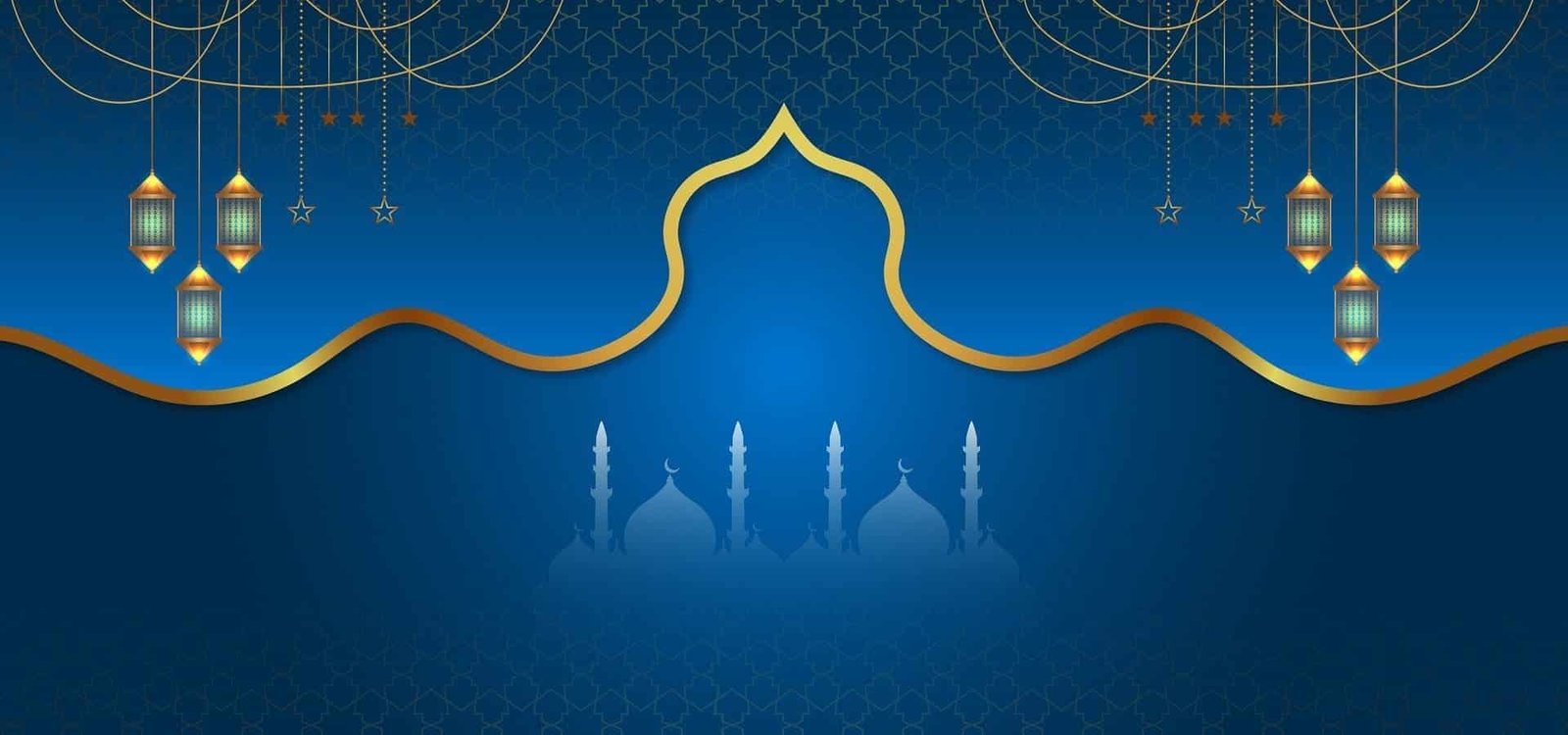The Six Pillars of Iman (Faith in Islam)
The pillars of iman in Islam derive their foundation through Quranic teachings and the sayings of Prophet Muhammad (peace be upon him). These foundational principles establish the path that determines how Muslims live their spiritual life. This section examines the complete details of the 6 pillars of faith Islam, of belief by directly referencing the Quranic verses and the Hadith.
1. Belief in Allah (Tawhid)
Belief in Allah’s absolute unity and existence makes up Iman’s initial and essential element. In Islamic belief, Allah independently created and continues to maintain and rule over the universe. Islamic faith declares Tawhid as its core principle, which states that Allah exists as a single being with no partners or associates.
Allah states in the Quran:
قُلْ هُوَ ٱللَّهُ أَحَدٌ ۞ ٱللَّهُ ٱلصَّمَدُ ۞ لَمْ يَلِدْ وَلَمْ يُولَدْ ۞ وَلَمْ يَكُن لَّهُۥ كُفُوًا أَحَدٌ
Translation:
Say, ‘He is Allah, [who is] One. Allah, the Eternal Refuge. He neither begets nor is born, Nor is there to Him any equivalent.’ (Quran 112:1-4)
(Surah Al-Ikhlas, 112:1-4)
A strong belief in Allah instills trust, humility, and devotion in a Muslim’s heart, guiding them to worship and obey Him alone.
2. Belief in Angels
The second position among the two pillars of Iman belongs to Mala’ika, the spiritual beings who emerged from light. Allah has assigned angels to deliver messages, track human activities, and guard believers.
Allah says in the Quran:
وَٱلْمَلَـٰئِكَةُ يُسَبِّحُونَ بِحَمْدِ رَبِّهِمْ وَيَسْتَغْفِرُونَ لِمَن فِى ٱلْأَرْضِ
And the angels glorify and praise their Lord and seek forgiveness for those on Earth. (Quran 42:5)
Among the most well-known angels in Islam are:
- Jibreel (Gabriel): The angel of revelation who conveyed the Quran to Prophet Muhammad (peace be upon him).
- Mikail (Michael): Responsible for providing sustenance, such as rain and crops.
- Israfil: The angel who will blow the trumpet on the Day of Judgment.
- Malik and Ridwan: Guardians of Hell and Paradise, respectively.
3. Belief in the Divine Books (Kutub)
Belief in the divine books revealed by Allah belongs to the three constituent parts of Iman. The books that guide human beings came to different prophets throughout time. As per Muslim belief, the following texts are sacred divine writings:
وَأَنزَلَ ٱلتَّوْرَىٰةَ وَٱلْإِنجِيلَ مِن قَبْلُ هُدًۭى لِّلنَّاسِ
And He revealed the Torah and the Gospel before as guidance for the people. (Quran 3:4)
The divine books include:
- Tawrat (Torah): Revealed to Prophet Musa (Moses).
- Zabur (Psalms): Given to Prophet Dawud (David).
- Injil (Gospel): Bestowed upon Prophet Isa (Jesus).
- Quran: The final and complete revelation from Prophet Muhammad (peace be upon him).
4. Belief in the Prophets (Anbiya’)
The fourth pillar of faith in Islam is belief in all the prophets sent by Allah.
Allah mentions:
إِنَّا أَرْسَلْنَٰكَ بِٱلْحَقِّ بَشِيرًۭا وَنَذِيرًۭا
Indeed, We have sent you (O Muhammad) with the truth as a bringer of good tidings and a warner. (Quran 2:119)
Belief in prophets strengthens one’s faith and offers valuable lessons from their lives and missions.
5. Belief in the Day of Judgment (Yawm al-Qiyamah)
The fifth pillar of Iman is belief in the Day of Judgment (Yawm al-Qiyamah).
وَنَضَعُ ٱلْمَوَٰزِينَ ٱلْقِسْطَ لِيَوْمِ ٱلْقِيَـٰمَةِ فَلَا تُظْلَمُ نَفْسٌۭ شَيْـًۭٔا
And We will set up the scales of justice for the Day of Judgment, so that no soul will be treated unjustly at all. (Quran 21:47)
6. Belief in Divine Decree (Qadar)
Iman’s sixth and final pillar is belief in Qadar, divine destiny.
وَكَانَ أَمْرُ ٱللَّهِ قَدَرًۭا مَّقْدُورًۭا
And the command of Allah is a decreed destiny. (Quran 33:38)
The Six Pillars of Islam and Their Importance
The practice of Islam depends on six essential pillars, which set the religious duties that all Muslims must follow. The structure of these essential pillars directs Muslims toward both spiritual growth and the accomplishment of righteous living through their daily worship.
- Shahada represents believing in Allah’s singular nature and Muhammad’s prophetic position (peace be upon him).
- The act of performing five daily prayers allows believers to enhance their connection with Allah.
- The religious duty of Zakat requires Muslims to distribute wealth portions to help needy individuals and cleanse their monetary earnings.
- The act of fasting during Ramadan helps believers build both self-discipline and spiritual consciousness through Sawm.
- Hajj (Pilgrimage): Performing Hajj once in a lifetime if physically and financially able.
- Through Jihad, one strives to preserve faith, establish justice, and acquire spiritual advancement.
The five pillars serve as fundamental elements supporting Muslim spiritual development through self-control, spiritual dedication, and deeper faith in Allah.
Kanzol Quran Online Academy: A Trusted Leader in Islamic Education
Kanzol Quran Online Academy established itself as a leading Islamic educational institution years ago to provide structured worldwide learning opportunities to students through its high-quality programs. Its trusted status enables the institution to offer students comprehensive Islamic science education through experts and a dynamic educational system.
The Benefits of Selecting Kanzol Quran Online Academy Come in Focus.
- Experienced & Trained teachers: Get tutored by well-experienced and Certified Islamic Scholars with vast knowledge of Islamic studies.
- Full Curriculum: Curriculum consists of Quranic Memorizing, Islamic Jurisprudence (Fiqh), Tafsir and Hadith.
- Online Quran classes are flexible to any age of students’ availability from anywhere in the world.
- One-on-One Personalized Coaching: Customized courses tailored to the unique learning needs and objectives.
- Interactive Teaching: Effective and modern ways and tools to enhance knowledge retention and understanding of Islamic knowledge.
People who want to master Islamic faith pillars and Islam trust Kanzol Quran Online Academy as their reliable source of authentic Islamic education. The institution helps committed students strengthen faith connections with the Quran by providing specialized training and organized educational processes.
Conclusion
Islamic faith and practice rest upon six fundamental pillars that serve as the basis of Muslim commitment. Following these beliefs, believers develop a profound spiritual bond with Allah, finding moral sense and life direction. Through these principles, Islam provides believers with foundations of discipline and devotion to Allah and his wisdom.
Allah should strengthen our faith while maintaining our firm religious devotion and guide us toward the path of righteousness. Ameen.
As a teaching institution, Kanzolquran teaches every Muslim to work and incorporate these pillars in their lifetime. For more information regarding Islamic teachings and courses, you can visit Kanzolquran.org, which provides information and resources on Islamic faith development.




